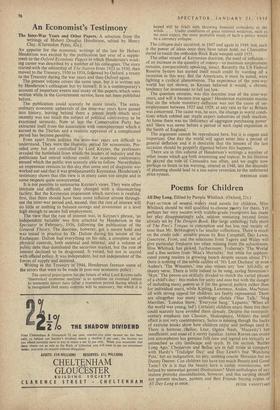Poems for Children
All Day Long. Edited by Pamela Whitlock. (Oxfordl, 21s.) PART-AUTHOR of several wisely read novels for children, Miss Whitlock should be well qualified to .choose poetry for them. Yet perhaps her very success with middle-grade youngsters has made her play disappointingly safe, seldom venturing beyond limits already set by The Dragon Book. Her large anthology falls short of The Poet's Tongue in conception and has less real ,variety of tone than Mr. Bebbington's far smaller collections. There is much on the credit side : notable pieces by Roy Campbell, Day Lewis. Gascoyne, Frost, and the selections from Tagore and Waley will give particular freshness too often missing from the schoolroom. Miss Whitlock has picked, furthermore, Traherne's 'The World' and a fine section from 'Man's Mortality,' but while for sophisti- cated young readers (a growing bunch despite moans about TV I there is nothing of the subtle calibre of 'My Last Duchess' or even Auden's 'The Witnesses,' one also misses any 'low' hill-billy or shanty verse. There is little indeed to be sung, saving Stevenson" 'Skye.' The poems are skilfully divided to match the varied phases of a child's day : this makes for unity and ease but with the danger of including many, poems as if for the general pattern rather than for individual merit, while Kipling, Lawrence, Auden, MacNeicc. all with strong appeal for children, are feebly represented. There are altogether too many anthology clichés ('Star Talk,' Meg Merrilies,"London Snow,' Everyone Sang,' Lepanto,"When all the world was young, lad'). Certainly children enjoy them but they could scarcely have avoided them already. Despite the twentieth- century emphasis (no Chaucer, Shakespeare, Milton) the total effect is not very contemporary. Satire is missing though the back of exercise books show how children enjoy and perhaps need it There is humour (Belloc, Lear, Ogden Nash, 'Macavity') but insufficient, and most of it surely familiar. James Reeves can evoke lost atmospheres but genuine folk-lore and legend are virtually a, untouched as city landscape and • myth. In the section 'Battle, Long Ago,' Chesterton and Belloc are in full stride in company with Hardy's 'Trafalgar Day' and Day Lewis's fine 'WatchiN Post,' but no indignation, no pity, nothing coarse. Horatius but tic Danny Deever. Can children too have too much Beauty and Goo( Taste? Or is it that the beauty here is rather monotonous, no helped by somewhat genteel illustrations'? Most ,anthologies of an stature provoke dissatisfaction, however, and, this carping should not prevent teachers, parents and Best Friends buying copies of All Day Long at once. PETER VANSITTAR r


































 Previous page
Previous page